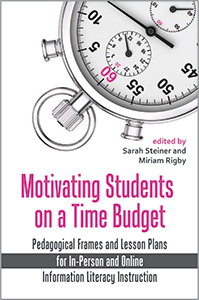
Primary tabs
You don't need to be an ALA Member to purchase from the ALA Store, but you'll be asked to create an online account/profile during checkout to proceed. This Web Account is for both Members and non-Members. Note that your ALA Member discount will be applied at the final step of the checkout process.
If you are Tax-Exempt, please verify that your account is currently set up as exempt before placing your order, as our new fulfillment center will need current documentation. Learn how to verify here.
- Description
- Table of Contents
- About the authors
As librarians, we often find ourselves outside the traditional structure of our education system. Time limits add another layer of complexity; how can we motivate students to learn when we only see them for an hour or two?
Motivating Students on a Time Budget begins with a section of research-based, broad-level considerations of student motivation as it relates to short-term information literacy instruction, both in person and online. It then moves into activities and lesson plans that highlight specific motivational strategies and pedagogies: Each encourages the spirit of play, autonomy, and active learning in a grade-free environment. Activities and plans cover everything from game-based learning to escape rooms to role playing to poetry, and are thoroughly explained to be easily incorporated at your campus.
While librarians have made great strides in integrating information literacy into long-term curricula, many of us have only one class session to make a difference. Consideration of human motivational strategies can have a profound effect on our attitude toward and approach to learners and, ultimately, on their levels of engagement, satisfaction, and success. The techniques outlined in Motivating Students on a Time Budget can help you feel empowered to use motivation research to meet your students where they are intellectually and emotionally, and empower and inspire them to cross conceptual thresholds critical to information interpretation and use.
Acknowledgments
Foreword
Introduction. Motivating Students on a Time Budget: Pedagogical Frames and Lesson Plans for In-Person and Online Information Literacy Instruction
Chapter 1. The ARCS Model and Audience Analysis: Learning About Student Motivations and Instructional Preferences
Krista Reynolds
Chapter 2. The Choice is Yours: Guiding Graduate Students to Construct Meaningful and Motivating Learning Goals
Lindsay Roberts
Chapter 3. “When Will I Ever Use This Again?” Cultivating Motivation Through an Authentic Learning Environment
Chapel D. Cowden and Jenny Holcombe
Chapter 4. Using Motivation Theory and Research When Teaching Information Literacy Online
Nick Faulk and Alan Carberry
Chapter 5. Using Authentic Teaching in Information Literacy Instruction to Improve Student Motivation
Josefine Smith and Anna Kozlowska
Chapter 6. Teaching Motivation That Works: Structuring Graduate-Level Research Support Workshops to Foster Centered, Focused, Self-Sufficient Learners
Wendy C. Doucette
Chapter 7. Tagging and Sticky Notes: Two Exercises for Teaching Students to Synthesize Prior Research
Rebecca Price
Chapter 8. Designing a Collaborative Cross-Campus Drop-in Workshop Series to Motivate Lifelong Learners
Tim Miller and Sarah Fay Philips
Chapter 9. Grinnell Science Project: Motivating First-Year Students to Persist in Scientific Inquiry
Kevin R. Engel, Rebecca Ciota, Elizabeth Rodrigues
Chapter 10. Level Up the One-Shot: Empowering Students with Backward Design and Game-Based Learning
Tarida Anantachai and Camille Chesley
Chapter 11. Examining Good-Game Design Mechanics that Enhance Student Motivation: A Case Study of “The Research Race” Game
Ngoc-Yen Tran
Chapter 12. “You’re Batman’s Only Hope”: Escape Room Activities in Academic Libraries
Kristen Lemay
Chapter 13. The List and the Spine: Poetry, Information Literacy, and Motivation
Sarah Kortemeier
Chapter 14. Choose a Topic, Choose a Group, Choose a Focus
Maggie Murphy
Chapter 15. Teaching Library Research and Critical Reflection Skills to Undergraduate Students Using the Techniques of Role Playing and Debate
Grace M. Jackson-Brown
Chapter 16. Introducing the Research Process: Lesson Plans for Undergraduate Instruction
Sarah Leeman and Amy Hall
Chapter 17. Piecing It Together: Encouraging Student Learning through Self-Assessment and Active Learning
Heather Johnson and Ashley Duguay
Chapter 18. Can I Have Your Attention, Please: Using Motivational Design and Feminist Pedagogy to Create Group Activities
Samantha Becker
Chapter 19. Practicing in Public: A Social Constructivist Approach to Research Skills Work in Online Discussion Boards
Katherine Luce
Author Biographies
Sarah Steiner
Sarah Steiner is the Head of Research & Instruction Services at Western Carolina University Library in Cullowhee, North Carolina. She has over a decade of professional experience with instruction and assessment, virtual and in-person reference coordination, and social media planning and management. As a 2011 Library Journal Mover & Shaker, Steiner was recognized for creating networking and professional development opportunities for librarians.
Miriam Rigby
Miriam Rigby is a social sciences librarian and serves as the collection manager for the social sciences at the University of Oregon Libraries. She earned her MLIS from University of Washington and a MA in cultural anthropology from the University of Chicago. Miriam’s research interests currently are focused on instruction and open access publishing.


